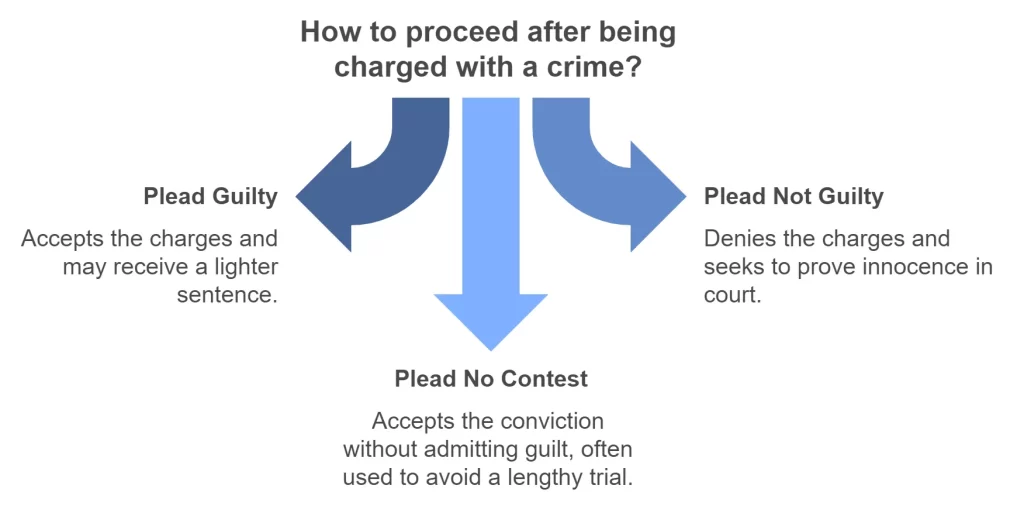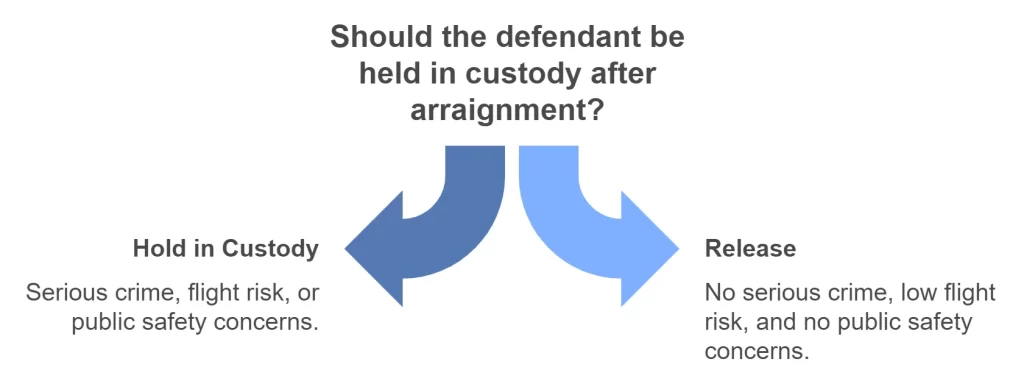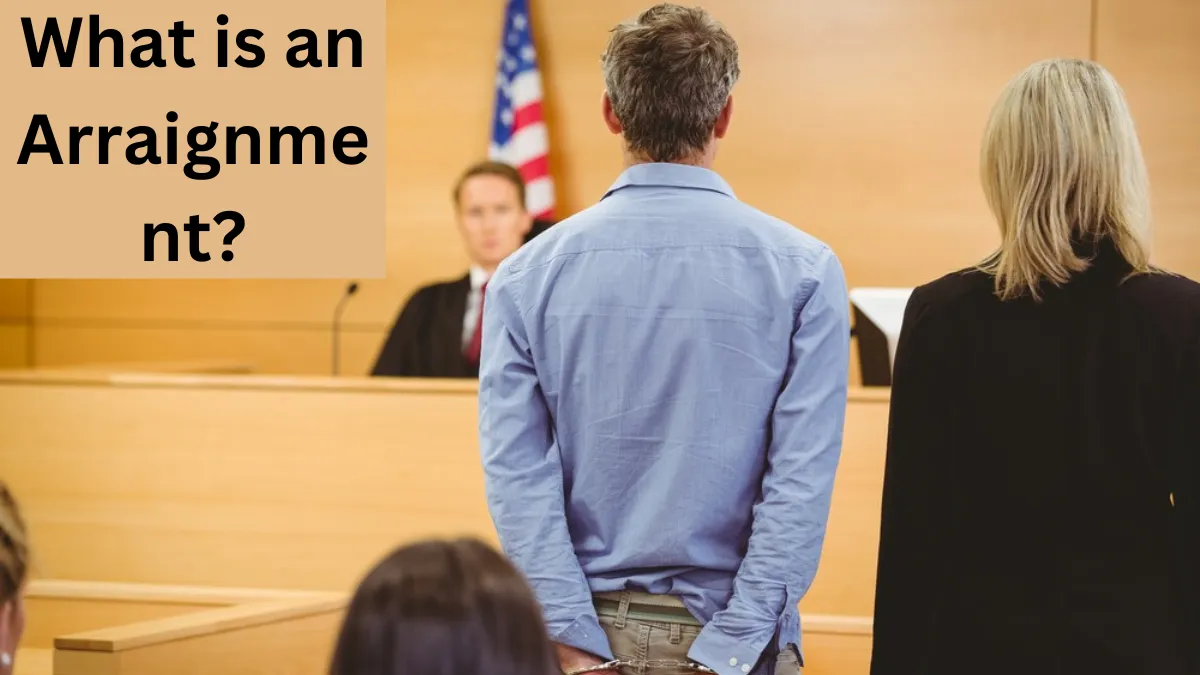Table of Contents
When facing criminal charges, the question is, “Can you go to jail at an arraignment?” This question often causes anxiety for the defendant, especially when facing potential criminal penalties. An arraignment is the first formal court appearance, also called the arraignment hearing, and this step in the criminal justice process is crucial.
During this process, many individuals worry about being taken into custody or whether they could go to jail immediately. The arraignment definition highlights that it is where charges against you are formally read.
This criminal process is part of the criminal justice system, involving charges for misdemeanor or felony offenses, including felony cases. This article will explore what happens at an arraignment, whether jail at an arraignment is likely, and how to protect yourself during this critical moment.
What is an Arraignment?
An arraignment is the first court appearance in the criminal court where the charges against the defendant are formally read. During this session, the judge will formally read the charges, and the defendant can enter a plea—guilty, not guilty, or no contest. This means you can plead guilty, enter a not-guilty plea, or accept the consequences without admitting guilt.
This session also informs you of your legal rights, such as the right to legal counsel. In some cases, the defendant might decide to use a waiver of arraignment or need legal help to understand the arraignment process better.
A skilled criminal defense attorney or criminal defense lawyer can help guide you. Hiring an attorney may be necessary, especially if you cannot afford one. This is why it’s crucial to consult a criminal defense attorney.
During an arraignment, you can enter a guilty plea, which means you could face a guilty plea or an arraignment is the first court hearing where a future court date will be set if the plea is not guilty. A preliminary hearing or trial may be scheduled if you plead not guilty.
An arraignment date is essential in the overall criminal proceedings and part of the legal process where the criminal defendant is informed of the nature of the charges against them.
Many people wonder if they will go back to jail or face time in prison if they do not need to post bail. The reality is that, depending on the charges, the judge may decide whether you can be taken to jail or sentenced to prison.
The court may consider the defendant’s criminal history, the type of criminal offense, and any felony or misdemeanor they are charged with. If facing accusations of a crime like a misdemeanor or felony, it can significantly affect what happens next. In this critical moment, the primary purpose of an arraignment is to ensure all arraignment process steps are carried out lawfully.
During the arraignment, several vital steps occur:

- Reading of Charges: The court formally presents the charges against you, informing you of the accusations.
- Entering a Plea: You’ll have the chance to plead “guilty,” “not guilty,” or “no contest” (nolo contendere). A “no contest” plea means you accept the conviction without admitting guilt.
- Appointment of an Attorney: If you cannot hire an attorney, the court will assign a public defender to represent you.
- Bail Decision: The judge will determine whether to set bail, release you on your recognizance, or keep you in custody
Can You Go to Jail at an Arraignment?
Yes, you can go to jail at an arraignment in certain situations. However, it largely depends on the severity of the charges, your prior criminal record, and the judge’s decision. If you are accused of a serious crime, the judge may place you in custody until your trial. However, many cases do not immediately impose jail time, especially for minor offenses. Bail or release options are often discussed at this stage.
What Factors Lead to Jail Time at an Arraignment?
Several factors can influence whether or not you will go to jail during an arraignment:
- Seriousness of the Crime: Felony charges are more likely to result in jail time than misdemeanors.
- Flight Risk: If the judge believes you may flee before your trial, they might order you to remain in jail.
- Public Safety: If the crime suggests you are a danger to others, the judge may also decide to keep you in custody. The key takeaway is that not everyone will go to jail at an arraignment, but it’s essential to understand the factors at play.

How Can You Avoid Jail at an Arraignment?
While it may feel overwhelming, there are steps you can take to avoid jail at an arraignment:
| Steps to Avoid Jail at Arraignment | Description |
|---|---|
| Hire an Attorney | A skilled defense attorney can help argue for your release or set reasonable bail terms. |
| Prepare for Bail | If jail time is possible, being prepared to post bail can significantly improve your chances of staying out of custody. |
| Show Responsibility | Demonstrating that you are not a flight risk or a danger to the public can help convince the judge to let you go home while awaiting trial. |
Also Read: How Does a Bail Bond Work? Unlock Freedom & Peace of Mind
What Happens After an Arraignment?
You may be released on bail or your recognizance if you don’t go to jail at your arraignment. This means you promise to return for your court dates without having to pay bail. After the arraignment, the case moves to the pre-trial phase, where both sides prepare their evidence and arguments. It would help if you continued working closely with your lawyer to build a strong defense.
Also Read: Can You Go to Jail at an Arraignment? Legal Insights
Preparing for Your Arraignment
As mentioned earlier, your arraignment typically occurs within two days of your arrest, giving you limited preparation time. The following actions are vital to take:
| Steps for Legal Preparation | Description |
|---|---|
| Consult an Attorney | Relying solely on a court-appointed public defender may be better due to their heavy caseloads. Hiring an experienced criminal defense attorney can be a valuable asset. They will explain the charges, protect your rights, and help you build your defense. |
| Gather Information | Collect relevant documents, such as the arrest report and details about bail. If you’re in custody, your attorney can assist with obtaining this information. |
| Plan for Bail | Be aware of your options for posting bail and make arrangements for financial support if necessary. If you comply with court instructions, your bail money will be returned after the legal proceedings conclude. |
Also Read: How Does God Speak to Us? Reveal Divine Messages and Guidance
Do I Need an Attorney for an Arraignment?
Although having an attorney at your arraignment is not mandatory, it’s highly recommended. A knowledgeable lawyer can guide you through the complex legal procedures, advise you on your plea, and advocate for your rights, reducing your anxiety and ensuring you are well-prepared for the process.
| Role of an Attorney | Description |
|---|---|
| Guide You on Pleas | Your attorney can advise you on whether to plead guilty or not guilty and explain the consequences of each choice. |
| Advocate for Bail | They can argue for reasonable bail or request that you be released on your recognizance. |
| Start Building a Defense | A lawyer can immediately develop a solid defense strategy. |
Can you be arrested at your arraignment?—The possibility exists, but the outcome is not always the same. With the right legal strategy and preparation, you can improve your chances of avoiding jail. Make sure to consult with an attorney to understand your rights and options thoroughly. This knowledge will empower you and help you make informed decisions during arraignment.




